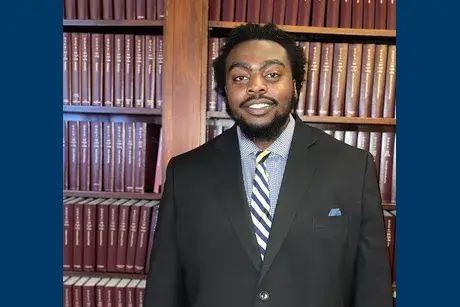Exploring Law from Classroom to Courtroom

Having the opportunity to learn about the legal system from the ground up was Dillon Donaldson’s main goal in law school. This past summer, Donaldson had the unique opportunity to look behind the curtain and get a close look at the inner workings of the justice system.
Donaldson worked as an intern at the United States District Court, District of Rhode Island for Chief Judge John J. McConnell, Jr.
“It was a very good hands-on experience where you were pretty much shadowing the judge’s every move when he was making decisions,” said Donaldson.
For his internship, Donaldson said that each week, he would be assigned a case. Judge McConnell would review the cases on the docket and then recommend a specific case for each intern. Donaldson said that his internship largely entailed watching hearings, whether in person or on Zoom.
For him, this internship was a valuable observational experience, one that allowed him to see how the judicial system functions.
“You got to have the full experience of what it is like to be in a judicial courthouse,” said Donaldson.
“After every hearing, (Judge McConnell) would bring you inside his chambers and then ask for our opinions about what happened during our meeting. Whether it was a hearing or another type of event, he talked with us beforehand about the decisions he would be making. Even though we were interns, he had a lot of trust in us and saw value in us as people who will be future lawyers and judges one day. I appreciated having the time to learn every week. You really didn’t know what you would get to learn.”
For Donaldson, this fall is another opportunity to continue learning about the fundamentals of the legal system, as he assumes a teaching assistant position for the school’s Race & the Foundations of American Law course.
The course, which was added to RWU Law’s core curriculum in 2021, is designed to “improve critical thinking about the law by offering important and often overlooked perspectives on race.”
“As an Afro-Jamaican American man who lives here in America, I understand adversity comes with being Black in America,” says Donaldson.
“The course not only acknowledges the history behind the law but also distinguishes between what was intended for free people and what was intended for people who were not free at the time, people who were not considered people. This course shows how there have been discrepancies in how we practice and make decisions and how we made new amendments and laws. (The course) shows how we became a country.”
Donaldson feels that everyone studying law can learn a lot from history and understanding the evolution of the American legal system from its creation to where it stands today. It is something that he believes can make for a stronger generation of future attorneys.
“I know we can't learn every bit of this history in one semester,” he says.
“However, even just putting that amount of time in compared to other institutions that don't mandate this type of instruction helps a lot. It makes you keep in mind how we should be compassionate and understand how we should practice law in the future. We start by learning our history.”
After graduating, the South Brunswick, New Jersey resident would like to concentrate on criminal law, as well as property real estate transactions. Additionally, Donaldson—who played defensive line for Wagner College for four years—would like to use his legal background to pursue opportunities in the sports and entertainment industry.
After being recruited out of high school by the University of Rhode Island football program, Donaldson became interested in the Ocean State. When researching law schools, he was drawn to Roger Williams, not just for its location but also the rich academic experience he ultimately has found here.
“It’s been a lot grander than I could have ever predicted,” Donaldson says of his time at the law school.
He says that the effort the professors put into being personable with students will help everyone there in the long run. Donaldson added that an education system that focuses on the human aspect is critical. For him, RWU Law is just that type of institution.
“No matter who you are at this institution, we will all be better for ourselves, our families, and our communities. A lot of that comes with hard work, as you need strength to overcome adversity. However, when you have professors and staff from various backgrounds that have a sense of empathy it helps you reach that next step.”
